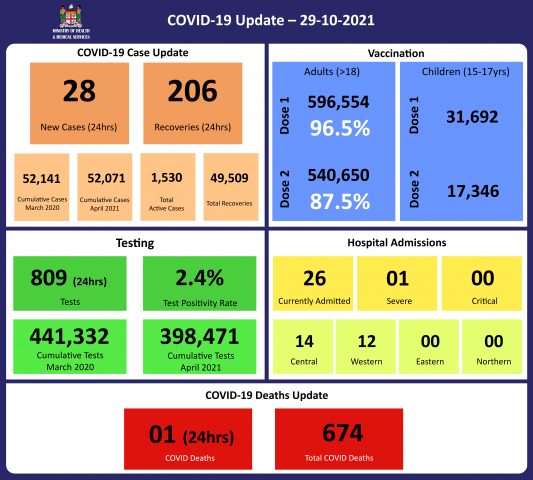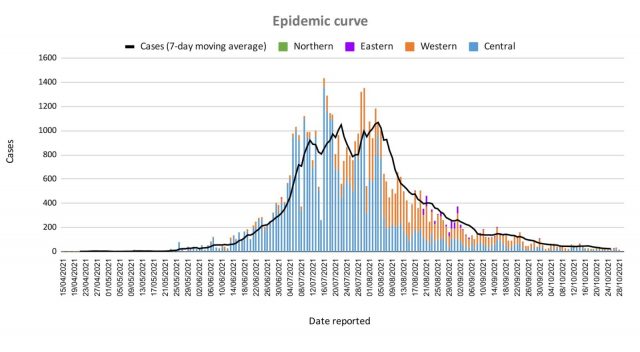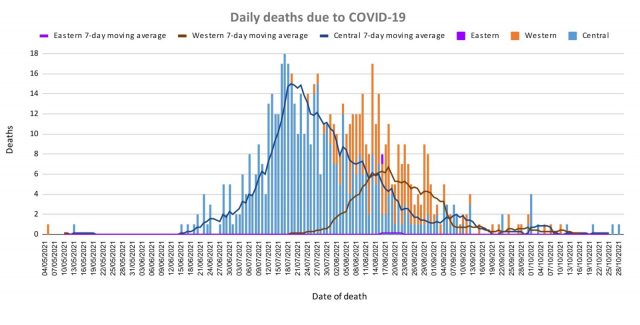COVID-19 Update – 29-10-2021
Epidemic Outlook:
The Ministry of Health continues to monitor the outbreak using indicators such as daily case numbers, hospitalizations, test positivity, and deaths. There is a downward trend across all indicators of the COVID-19 epidemic in Fiji, indicating a positive response to our overall COVID containment and mitigation response.
Occupancy rates in health facilities, the occupancy rate of ICU beds, death rates, and vaccination coverage are indicators to monitor our health response capacity and we see a decreasing trend across indicators from our health facilities with increasing vaccination coverage for adults and 15-17-year-olds in Fiji.
Our weekly testing numbers of over 7,000 are still above the WHO recommended rate of 4 tests per 1,000 population per week (or approx.. 3,500 tests per week) and we anticipate continued surveillance and testing in our communities and maritime islands to monitor and detect cases for early intervention.
Public Advisory:
Preparation for Quarantine Free Travel to the Northern Division
Our current vaccine coverage data indicates a need for MOHMS to provide additional resources to Nabouwalu Hospital to prepare for the possible escalation of COVID 19 cases and adverse events. The second dose vaccination coverage for the Bua subdivision remains a concern based on the MOH vaccination coverage data. This will have to be a key strategy in remodelling the health service provision to ensure:
- Community surveillance through a test, trace, and track protocols are being escalated to help us identify and contain any outbreak early.
- Registration and line listing of vulnerable persons especially in poorly vaccinated areas are done;
- Preparations for the monitoring of positive cases and vulnerable persons to ensure better access to appropriate care plans has been made;
- Clinical care protocols for the severe disease has been reviewed and strengthened;
The Whole-of-Government Community Engagement initiative will be escalated in the North with particular attention made to the Bua Subdivision and this will include a reduction of the dose interval to 6 weeks. We look forward to the engagement of all community leaders to facilitate this exercise.
Exemption From Vaccination
We have received a number of requests for exemption from vaccination on medical grounds. The exemptions on medical grounds are provided for the following reasons:
- Documented history of severe allergic reaction to a component of each currently available COVID-19 vaccine;
- Documented history of severe or immediate-type hypersensitivity allergic reaction to a COVID-19 vaccine, and separate contraindication to other available formulations;
- Receiving immunosuppressive treatment(treatment that weakens the body’s immune system) and advised by a medical provider to defer vaccination to a future date;
- For those with a medical condition, please be advised that in most cases vaccination is even more indicated. While an opinion by a medical provider to forgo vaccination or to defer vaccination will be considered, this requires that the application is accompanied by documentation to prove that the person has the medical condition as stated. Furthermore, the final decision on exemption will be based on consensus guidelines from the Strategic Advisory Group of Experts on Immunization (‘SAGE’) and similar international authoritative bodies. (https://manhwatop.com/)
The following conditions that are NOT considered for a medical exemption include:
- History of severe allergic reactions to foods, oral medications, latex, pets, insects, and environmental triggers;
- History of immunocompromising conditions where the vaccine may be less effective;
- Fear of needles;
- History of vaccine side effects or general avoidance of vaccines.
International Travel
From 11th November through to 1st December 2021, Fiji will only accept fully vaccinated permit holders, Fijian passport holders, and returning residents who will be required to undertake a 3-day quarantine in a Fiji Managed Quarantine facility and will be subject to RT-PCR tests 72 hours pre-departure and in-country. Beginning 1st December 2021, Fiji will be open to fully vaccinated travelers from Travel Partner Countries for reduced quarantine arrangements on arrival.
The Ministry of Health and Medical services is also in the final phases of:
- Re-escalating our community surveillance back to containment phase levels with a strong emphasis on our careFIJI to facilitate tracking and rapid contact tracing efforts;
- Strengthening our line listing for positive cases and vulnerable persons;
- Ensuring better access to Clinical monitoring and outreach capability and retrieval services for those in the line list;
- Strengthening our Clinical Care Protocols
The public is reminded that there will always be people vulnerable to the virus despite our high vaccination coverage. We have one-third of the population under 18 years old, most of whom still need to be vaccinated. We will have older people with comorbidities whose ability to build up vaccine immunity is not as good as younger and healthier persons. Also of concern is that we will have unvaccinated people in our communities who are also not exposed to the virus, and hence do not have any protection against the disease, and among them are elderly persons and those with serious comorbidities. As such, future resurgence of infections and increased case numbers will again test our critical care capacities. We are constantly reviewing and updating our healthcare protocols so we can respond effectively to future outbreaks.
The key to avoiding future restrictions and lockdowns is for the public to remain cautious about how they engage in the greater freedom they will enjoy. Whilst the easing of restrictions is needed to facilitate social and economic livelihood, the public must ensure that together with vaccination, we continue to observe our COVID safe measures and avoid contained spaces and crowds.
The potential for transmission in any community will be slower, and the ability to contain the outbreak better, when we achieve a high vaccination rate and also maintain strict adherence to COVID safe measures. When we do this, we not only protect ourselves but also protect all those around us, especially the vulnerable, those not eligible for vaccination, and those who are not yet vaccinated.
Last Updated on 1 year by Publishing Team



